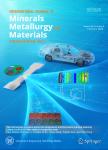Effect of friction heat on tribological behavior of M2 steel against GCr15 steel in dry sliding systems
Effect of friction heat on tribological behavior of M2 steel against GCr15 steel in dry sliding systems作者机构:School of Mechatronic Engineering Henan University of Science and Technology Luoyang 471003 China Theory of Lubrication and Bearing Institute Xi'an Jiaotong University Xi'an 710049 China School of Material Science and Engineering Henan University of Science and Technology Luoyang 471003 China
出 版 物:《Journal of University of Science and Technology Beijing》 (北京科技大学学报(英文版))
年 卷 期:2007年第14卷第6期
页 面:512-516页
核心收录:
学科分类:08[工学] 080502[工学-材料学] 0805[工学-材料科学与工程(可授工学、理学学位)]
主 题:heat partition contact temperature dry friction dynamic temperature
摘 要:The tribological behavior depends significantly on friction heat under high sliding velocity. Many factors influence the conduction rate of friction heat, such as thermophysical properties of the pairs, the formation components of interface-film, environment mediums, etc. Through theoretical and experimental studies on surface temperature, the heat partition approaches have been applied to the pairs of M2 steel against GCr 15 steel to compare and discuss their tribological behavior in dry sliding contact. The results indicate that the values of the contact pressure have little effect on the heat partition at a high sliding velocity of 40 m/s. Furthermore, the degree of correlation between the dynamic temperature and friction coefficient is obvious, and the correlation degree of parameters increases as the pressure grows. A close correlation exists among the temperatures measured from different points of the pin specimen. At last, X-ray diffraction analysis denotes that the carbides of secondary M6C are separated out during the process of friction.



